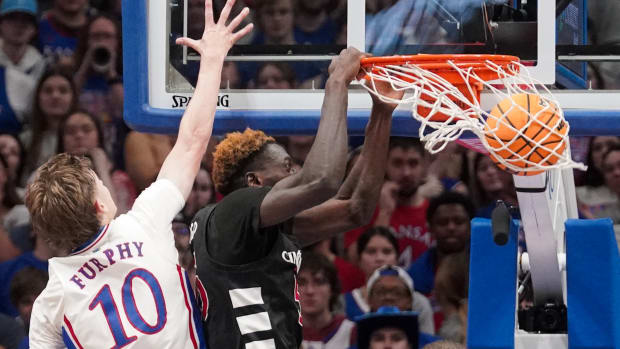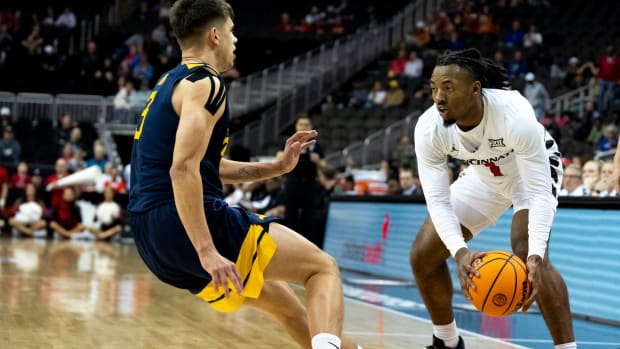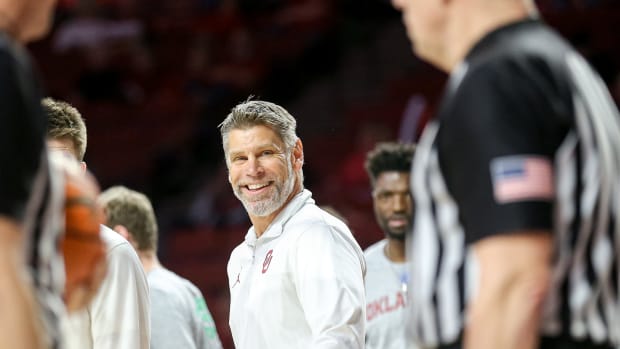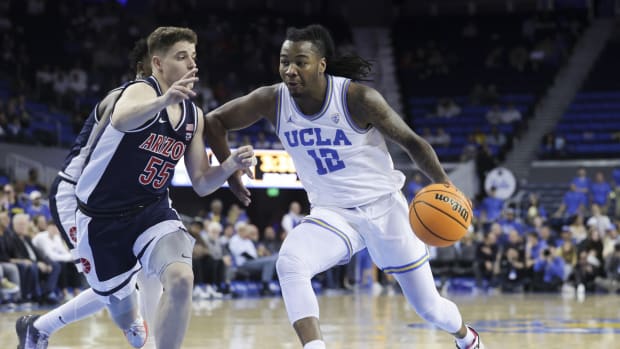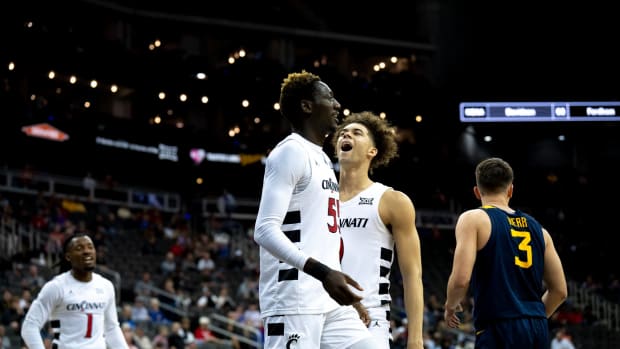Ranking the 2022 Men’s Sweet 16: Who Looks Strongest?
What was once 68 is now just 16 after six days of near-nonstop hoops action.
The men’s Sweet 16 is set, and after a week of upsets it’s time to reset and rerank the teams still in contention to cut down the nets in New Orleans. Nine different seed lines and eight different conferences are represented as we head into the tournament’s second weekend, and three of the four No. 1 seeds remain standing (but not defending champ Baylor). Who’s the team to beat? And who’s just lucky to still be dancing? Here’s our updated top 16 power rankings.

Paolo Banchero, Drew Timme and Justin Moore (left to right).
Junfu Han/USA TODAY NETWORK; Craig Mitchelldyer/AP; Geoff Burke/USA TODAY Sports
1. Gonzaga (No. 1 seed, West Region)
It took more work than expected for the Zags to advance out of the first weekend for the seventh straight tournament, but after surviving a pair of upset bids from Georgia State and Memphis, they’re in the Sweet 16 yet again. Gonzaga’s struggles with Memphis were, again, emblematic of the team’s vulnerability against lineups with elite athleticism and physicality, which could cause some issues for the Bulldogs in later rounds—especially in a potential Elite Eight rematch with Duke.
2. Arizona (No. 1 seed, South Region)
The Wildcats got all they could handle from TCU in the round of 32, but the second overall seed in the field advanced thanks to huge late moments from Bennedict Mathurin and Christian Koloko. We know this group can be more explosive than anyone on the offensive end when at its best, and a few more days for Kerr Kriisa to rest his ankle will be a good thing for Tommy Lloyd’s team. Sweet 16 opponent Houston could cause some problems, though, considering how the Cougars defend.
3. Villanova (No. 2 seed, South Region)
Villanova is a very tough team to beat when it gets good frontcourt play, and it got just that in its first two games in the Big Dance. Center Eric Dixon was in double-figure scoring for both games, while veteran forward Jermaine Samuels went for 15 and 17 points in the Wildcats’ two wins in Pittsburgh. Nothing this team does will wow you, but it shares the ball at a high level, makes shots and has a clear identity. Plus, the Wildcats have a championship coach in Jay Wright. That’s a hard combination to bet against.
4. Kansas (No. 1 seed, Midwest Region)
Kansas received quite the push from an undermanned Creighton team but survived the upset bid to advance to its first Sweet 16 since 2018. One positive in that second-round win over the Bluejays was a huge day from point guard Remy Martin, who came off the bench to tally 20 points, seven rebounds and four assists compared to just one turnover. The Jayhawks are a different team offensively when they have a point guard that can make shots to go along with Ochai Agbaji and Christian Braun. And with four straight games in double figures, Bill Self may finally be getting the most out of Martin at the right time.
5. Duke (No. 2 seed, West Region)
Coach K and the Blue Devils flirted with disaster in the second round against Michigan State, trailing late before rallying to knock off the Spartans and book a trip to the second weekend. Duke did little to assuage fears about its defensive concerns against Sparty, conceding more than 1.2 points per possession. Still, there may not be a more talented team in the country than this Duke team, and it already beat West No. 1 seed Gonzaga in Las Vegas back in November.
6. Texas Tech (No. 3 seed, West Region)
The nation’s top-ranked defense advanced to the program’s third Sweet 16 in the last four tournaments by squeezing past Notre Dame in a tightly contested second-round matchup. It wasn’t the prettiest performance, but this time of year it doesn’t have to be. You know what you’re going to get from the Red Raiders: defense, toughness and enough shotmakers to hang around in any game. We’ll see whether they have the firepower to get to a Final Four, but any team that beats Tech will have had to earn it against a team that plays as hard as any in the sport.
7. UCLA (No. 4 seed, East Region)
Back in the second weekend for the second season in a row, UCLA got quite the first-round scare from Akron before cruising past Saint Mary’s to punch its ticket to Philadelphia for the Sweet 16. Given the Bruins’ March experience, combined with top-two seeds Baylor and Kentucky going down in the first weekend, UCLA should be seen as the favorite to escape the East and get back to the Final Four.
8. Purdue (No. 3 seed, East Region)
Many pegged the Boilermakers as vulnerable to an early exit because of their season-long struggles on the defensive end, but Purdue is one of just two Big Ten teams still standing in the second weekend. Jaden Ivey is one of the most explosive players in the sport and looked more locked in than ever in the Boilers’ win over Texas on Sunday night, drilling a key three late and scoring 18 points on just seven shots in an 81–71 victory. Plus, after losses by Baylor and Kentucky, the Boilermakers are the highest remaining seed in the East.
9. Houston (No. 5 seed, South Region)
The Cougars got more wins over top-50 KenPom foes (two) in the first two rounds of the NCAA tournament than they did all season long. It was an impressive showing in Pittsburgh for Kelvin Sampson’s club, which is headed back to the Sweet 16 despite all the injuries it’s dealt with this season. The bottom line is this: Houston plays so hard and so connected that it is difficult to play against, even without the star power it had when Marcus Sasser was in the lineup earlier in the year.
10. Arkansas (No. 4 seed, West Region)
The Hogs faced a pair of excellent mid-major teams this weekend, and survived major tests from Vermont and New Mexico State. The Razorbacks are now off to a second straight Sweet 16 after previously having not gone since 1996 under Nolan Richardson. The defensive end has keyed Arkansas’s turnaround in the last two months; it’s been the nation’s third-best defense since Jan. 8, per T-Rank. It will need a yeoman’s effort on that end to get past top overall seed Gonzaga in San Francisco this week.
11. Providence (No. 4 seed, Midwest Region)
So much has been made this season about Providence’s remarkable run in close games, but the Friars mostly coasted through the first two rounds in Buffalo. After keeping No. 13 seed South Dakota State at arm’s length most of the way, Providence blew out Richmond to punch the program’s first ticket to the Sweet 16 in 25 years. Ed Cooley’s club won’t overwhelm you talent-wise, but it’s balanced and incredibly disciplined on both ends. Six players averaged eight or more points per game in the first weekend of the tourney.
12. North Carolina (No. 8 seed, East Region)
The Tar Heels advanced to the second weekend with a dominant win over Marquette, followed by avoiding an epic collapse to take down defending national champion Baylor. For all the Tar Heels’ flaws, they’ve clearly found something with the five-man lineup they’ve deployed heavily down the stretch. RJ Davis is giving UNC high-level play at the point guard spot, Brady Manek has scored a combined 54 points in his last two games and Armando Bacot is a force to be reckoned with inside. Consistency has been a problem, but the door is wide open in the East for the Heels to win the region and go to the Final Four.
13. Miami (No. 10 seed, Midwest Region)
What drives the Hurricanes is their tremendous guard play. Auburn simply couldn’t keep the Canes’ backcourt trio of Charlie Moore, Isaiah Wong and Kameron McGusty out of the paint, and once they got downhill the Miami guards made big play after big play to take down the Tigers. Miami isn’t a very good defensive team and got outrebounded by 5.5 boards per game in ACC play. But when you get great backcourt play in a single-elimination tournament, you’re going to be a tough out.
14. Michigan (No. 11 seed, South Region)
You can debate whether the Wolverines even deserved to be in this tournament, but Juwan Howard’s team has made its mark on the Big Dance since getting in. After getting punched in the mouth early by Colorado State, the Wolverines played tremendous basketball in its final 60 minutes of action in the first two rounds, knocking off a red-hot Tennessee team in the process. Hunter Dickinson averaged 24 points in the first weekend and has risen to the occasion on the sport’s biggest stage. This team can beat anyone when it plays its best.
15. Iowa State (No. 11 seed, Midwest Region)
The Cyclones essentially going on the road and beating Wisconsin in Milwaukee to get to the Sweet 16 is yet another remarkable accomplishment in an overachieving Year 1 in Ames for T.J. Otzelberger. This Iowa State team is clearly very limited—it ranks outside the top 150 in offensive efficiency, per KenPom, and won both games this past weekend despite not topping 60 in either. But the Cyclones really defend and have tough guards who can make big plays in big moments, and that’s often enough in March.
16. Saint Peter’s (No. 15 seed, East Region)
The Peacocks are the story of the tournament, as the small Jesuit school from Jersey City shocked the world by knocking off Kentucky and then Murray State to become the first MAAC team ever to make the men’s Sweet 16. Can Saint Peter’s pull off yet another upset against Purdue? They may be undersized, but the Peacocks did a tremendous job on the glass against Oscar Tshiebwe and Kentucky and certainly won’t back down against the massive Purdue bodies up front.
More March Madness Coverage:
• Men’s Sweet 16 Is Truly Diverse—and Unpredictable
• Big Ten Disappoints Again in Men’s First Weekend
• The ACC Showed Up to Dance
















